

The SIM_AGENT Package. The University of Birmingham School of Computer ScienceThe Cognition and Affect Project Aaron Sloman Slide Presentation on SimAgent Demonstration movies NOTE ON FORMATTING: Adjust the width of your browser window to make the lines of text the length you prefer.
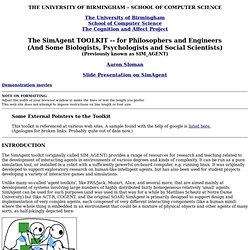
This web site does not attempt to impose restrictions on line length or font size. Some External Pointers to the Toolkit This toolkit is referenced at various web sites. The SimAgent toolkit (originally called SIM_AGENT) provides a range of resources for research and teaching related to the development of interacting agents in environments of various degrees and kinds of complexity. That schema accommodates a wide variety of specific architecture types, which differ according to which mechanisms and information structures occur in which boxes, and how they are connected to one another and to the environment, as described in this overview. (includes download instructions). RMIT Agents Group - Prometheus & PDT. The breve Simulation Environment.
What is breve?
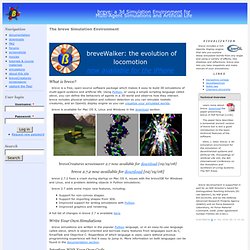
Breve is a free, open-source software package which makes it easy to build 3D simulations of multi-agent systems and artificial life. Using Python, or using a simple scripting language called steve, you can define the behaviors of agents in a 3D world and observe how they interact. breve includes physical simulation and collision detection so you can simulate realistic creatures, and an OpenGL display engine so you can visualize your simulated worlds. breve is available for Mac OS X, Linux and Windows in the download section. breveCreatures screensaver 2.7 now available for download [02/19/08] breve 2.7.2 now available for download [02/19/08] breve 2.7.2 fixes a crash during startup on Mac OS X, issues with the breveIDE for Windows and Linux, and a problem deleting objects in Python simulations. breve 2.7 adds some major new features, including: Support for non-convex shapes.
Write Your Own Simulations Interface With Your Own Code Feedback and Bug Reports About the Author Links. ECJ. ECJ is a research EC system written in Java.
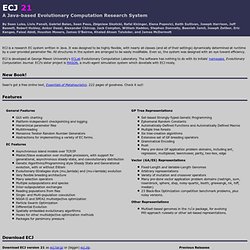
It was designed to be highly flexible, with nearly all classes (and all of their settings) dynamically determined at runtime by a user-provided parameter file. All structures in the system are arranged to be easily modifiable. Even so, the system was designed with an eye toward efficiency. ECJ is developed at George Mason University's ECLab Evolutionary Computation Laboratory.
The software has nothing to do with its initials' namesake, Evolutionary Computation Journal. New Book! Sean's got a free online text, Essentials of Metaheuristics. 222 pages of goodness. Features Download ECJ Reviews Genetic Programming and Evolvable Machines has reviewed ECJ, and kindly, a few times. Mailing Lists If you have questions or ideas regarding ECJ, we suggest you join the ECJ-INTEREST Discussion List. Some other Publically-Available Java-Based Genetc Programming Systems Tree-based GP, implemented with trees Tree-based GP, implemented with arrays GP Applets. MASON Multiagent Simulation Toolkit. [paper] Keith Sullivan and Sean Luke. 2012.
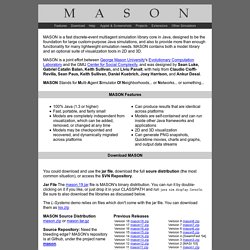
Real-Time Training of Team Soccer Behaviors. In Proceedings of the 2012 RoboCup Workshop. [paper] Keith Sullivan, Katherine Russell, Kevin Andrea, Barak Stout, and Sean Luke. 2012. RoboPatriots: George Mason University 2012 RoboCup Team. AlphaWorks Community. Complex systems.
Complex systems present problems both in mathematical modelling and philosophical foundations.
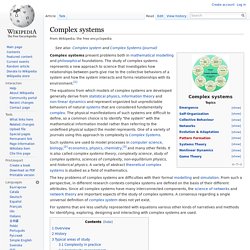
The study of complex systems represents a new approach to science that investigates how relationships between parts give rise to the collective behaviors of a system and how the system interacts and forms relationships with its environment.[1] Such systems are used to model processes in computer science, biology,[2] economics, physics, chemistry,[3] and many other fields. It is also called complex systems theory, complexity science, study of complex systems, sciences of complexity, non-equilibrium physics, and historical physics. A variety of abstract theoretical complex systems is studied as a field of mathematics. Multi-agent system. Simple reflex agent Learning agent Concept[edit] Multi-agent systems consist of agents and their environment.
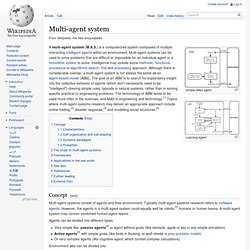
Typically multi-agent systems research refers to software agents. However, the agents in a multi-agent system could equally well be robots,[5] humans or human teams. Agents can be divided into different types: Very simple like: passive agents[6] or agent without goals (like obstacle, apple or key in any simple simulation)Active agents[6] with simple goals (like birds in flocking, or wolf–sheep in prey-predator model)Or very complex agents (like cognitive agent, which contain complex calculations) Environment also can be divided into: Virtual EnvironmentDiscrete EnvironmentContinuous Environment Characteristics[edit] The agents in a multi-agent system have several important characteristics:[10]